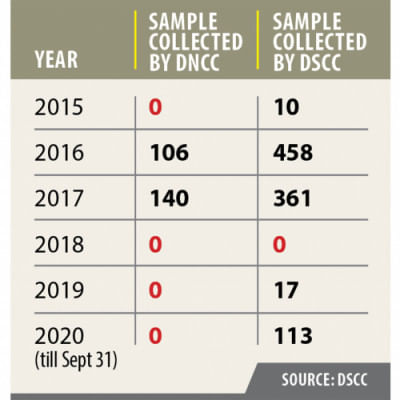A forgone mandate: Dhaka city corporations’ food inspection activities virtually non-existent

The two Dhaka city corporations have the mandate of keeping a check on food safety, but have been doing next to nothing to this end for several years.
They have facilities like a dedicated food testing lab, a court for filing food safety-related cases, and food inspectors, but data show collection of food samples for testing is abysmal and highly irregular in both city corporations.
While Dhaka South City Corporation (DSCC) has been collecting samples at fluctuating consistency every year, Dhaka North City Corporation (DNCC) has not collected anything for the last three years.
There are 17 food inspectors, known as sanitary officers (SI) at the two city corporations -- nine at DNCC and eight at DSCC -- for collecting samples such as dairy products, cookies and beverages. They are also responsible for inspecting restaurants.
After collecting samples, they are supposed to send them to the Modern Food Testing Laboratory and Training Centre. If any sample fails tests, staffers are authorised to file case with DSCC's Pure Food Court against the manufacturing company.
But there is virtually no implementation of this process. In 2018, neither city corporations collected any sample, and since then, DSCC has collected 130 (up till September 2020) while DNCC has collected zilch.
Wishing anonymity, some officials said the current scenario is because of there being no target for sample collection. There is no monthly requirement for inspecting restaurants or hotels to check hygiene.
"We also can't perform our main work because we are often assigned to accompany mosquito drives or carry out other work," said a sanitary inspector of DSCC, wishing not to be named.
A sanitary inspector of DNCC told this correspondent, "Whenever we collect samples, we must pay for the products out of our pockets, and the authority doesn't want to reimburse us. Besides, we also must spend our own money while filing cases and for transport."
"Therefore, sanitary inspectors are not incentivised to collect samples," he added.
Experts concerned with food safety say sample collection is unsatisfactory, and authorities must seriously monitor this issue. With product volume increasing, testing should have ramped up as well.
Former Food Safety Authority Chairperson Mahfuzur Rahman said, "Sample collection is very low when the market and city's area is considered. At the same time, the inspectors need proper support to execute their duty."
When asked about sample collection or inspection targets, he said since the sanitary inspectors work based on receiving complaints, and city corporation areas often expand, authorities do not set strict targets.
Consumer Association of Bangladesh President Ghulam Rahman said, "All this shows employees' lack of responsibility and inadequate monitoring by authorities. If these issues were taken care of, the sanitary inspectors wouldn't be able to go on without properly executing their duties for three years."
"They should provide an explanation for this. If they can't, necessary action should be taken as per law," he added.
When approached for this matter, DSCC Chief Health Officer Brig Gen Md Sharif Ahmed refused to talk or meet the reporter.
DNCC Deputy Chief Health Officer Lt Col Md Golam Mostofa Sarwar said that a major reason for these issues is workforce crisis. "We have 10 zones and need two sanitary inspectors in each. In total, we need 20 officers but only have nine."
Talking about responsibilities of the officers, he said, "They are supposed to inspect the food market and restaurants, and send samples to the laboratory. However, that is not happening."
"Due to workforce shortage, whenever drives take place, like ones for mosquito control or billboard removal, they have to be present. If Rapid Action Battalion sends requisition for any drive, they have to be there too." he added.
"Since they are often preoccupied with other work, we directed them to send at least one sample to the laboratory monthly," the official said, adding that DNCC could not monitor the sector properly for the last few years due to being occupied with dengue-related work. Now, they are trying to bring everything under discipline, he added.
Regarding claims of sanitary inspectors paying for samples out of their pockets, Lt Col Sarwar denied it, saying the reimbursement may come late, but they do receive it.
"After buying samples, they can send vouchers to the respective zonal executive officer, and DNCC will reimburse them accordingly. Although they complain of getting late payments, this can't be an excuse," he added.

 For all latest news, follow The Daily Star's Google News channel.
For all latest news, follow The Daily Star's Google News channel. 



Comments